|
 |
 |
 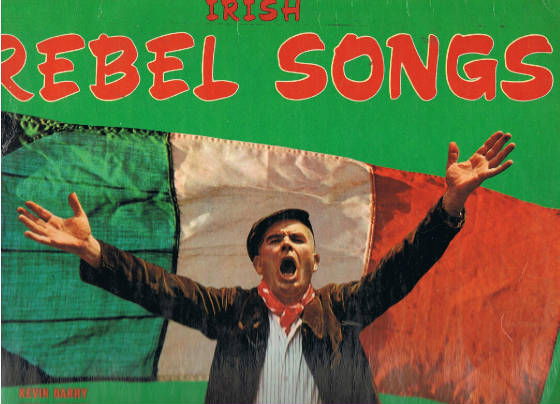
Clashmealcon Caves-Irish Civil War Song
It being on a Sunday morning early in
the month of spring,
The rifle shots rang in their ears, the chapel bell did ring,
But louder still their shots rang
out, you could hear the thunder roar,
As the ambush it was taking place down by the Shannon shore.
In Dunfort's cave they took their stand, the last in Ireland's rights,
Three days and nights with rapid fire they
nobly held the fight,
Till worn out without relief they did at length give o'er
And they gave their lives for Ireland
down by the Shannon shore.
McGrath and Shea were washed away as the foaming tide did rise,
Their comrades knew that they were doomed when they
heard their
drowning cries,
They knew they could not hold the fight, being then reduced to four,
And they yielded
to their enemies down by the Shannon shore.
Ned Greaney, Mac and Hathaway in irons soon were bound
And taken off to Tralee jail, where guilty they were found,
They
were placed before the firing squad, which quickly on them
poured,
And now they sleep in martyrs' graves down by the
Shannon shore.
Their captain was a brave young man with a heart both light and bold
It was said he knew that death was due as soon
as he tied the rope,
Timothy Lyons it was his name from a place called Garranagore
And he too met his doom in his youthful
bloom, down by the Shannon
shore.
Their comrades sorely miss them gone, their loss they now deplore,
When strangers came to view the cave and roam along
the shore,
There to enjoy the pleasant time while other heats feel sore,
And that will be for years to come down by
the Shannon shore.
And now to end this mournful rime, I have no more to say,
The cave will be their monument and that for many a day.
May
God reward these guileless souls and blessing on them pour,
Console their friends who miss them gone, down by the Shannon
shore,
THE ORANGEMAN'S GALWAY BAY
Sang to the tune of Galway Bay
Maybe some day I'll go back to dear old Ulster,
Be it only on the twelfth day of July.
To see once more the Orangemen
in procession,
And watch those loyal men go marching by.
To see again King William on the banner,
Our gracious Queen sown on the other side.
Or to sit beside Craigavon on the platform,
When he tells us how the men of Derry died.
The winds that blow across the seas from Ulster,
Are perfumed with Orange lillies as they blow.
And the men who honour Aughrim and Boyne waters,
Speak a language that the Fenians do not know.
Yet the Fenians always try to teach us their ways,
And scorn us for being what we are.
But we want no Fenian Pope or Holy Water,
No Surrender' is our watchword near
and far.
And if there's going to be a fight hereafter,
And somehow soon sure there's going to be.
We'll make the Fenian's blood flow just like water
Down Belfast Lough into the Irish Sea.
THE WILD HAZEL GLEN
(A '98 rebel song Song)
The Yeomen trooped down on the village,
Red
ruin they left in their trail.
And the flames licked the rooftops at midnight,
Like banners they streamed on the gale.
The
groans and the- shrieks of the dying,
Woke the echoes again and again,
And the 'caoines' were the wail of the banshee,
That night in the Wild Hazel Glen.
Young Diarmuid was bold as an eagle,
He was chief of the patriot band;
Who were watching far-off on the hillside
Awaiting the clash on the land.
And
when morning its glories were beaming,
O'er the moorland at long Carrig Fen,
They marched with the pike blades a-gleaming
A-down
through the Wild Hazel Glen.
They swept like the rain-swollen torrent,
Death 'slept on each keen-pointed blade,
And their bosoms were panting for vengeance,
For the sisters and sweethearts betrayed.
And the wives and the fathers and mothers
That lay shroudless and coffinless then,
And the homes that were blackened
and roofless
That morn in the Wild Hazel Glen.
But sad are the hearts that loved Diarmuid,
For he fell in the vanguard that day;
But whenever his rifle was levelled,
<A yeoman went down in the fray.
Old Ireland you never had martyrs
More true than the frieze-coated men,
Whose life-blood has reddened our altars
Down many a Wild Hazel Glen.
Joseph McKelvey was from Stewartstown Co.Tyrone
late of Cyprus Street Belfast, Captured at the four courts
and was executed in Mountjoy Jail December 8th
1922. Buried in Milltown cemetery Belfast.
Joe Mc Kelvey song lyrics - a tribute
0, Give him a place among Ulster's dead
Who gave battle
for Ireland's weal?
Who have fought and died to free this land
From the English tyrant's heel.
The true and brave
who in every age
Came thronging at Freedom's call,
McKelvey stood where they shed their blood-
He remembered and
loved them all.
From Breffni's lakes up to Antrim's glens,
Through Derry and green Tir Eoghain;
From the fields of Down to Lock
Swilly's waves,
From Cuailene to Inis Eoghain;
To every spot that had seen the Gael
And their English foemen fall,
McKelvey
sped on a soldier's quest-
He knew them and loved them all.
He was lover of Neilson and Betsy Gray,
Of McCracken and brave Munro;
Of Hope and On and of Sean and Eoghan,
And
of Aodh 0 Domhnaill Ruadh.
In town and vale he told their tale,
And cried to his comrades all
Their faith to keep
and their foes to sweep
From the fair land of Inis Fail.
With Barrett, O'Connor and Mellows brave
They killed him at dawn of day,
Because he was true to his country's cause
And
a foe to the Saxon sway.
For the truth they died; they are Ireland's pride
From Ciarraidhe to Dun na nGall;
McKelvey
is ours till the end of Time,
Rut we honour them all
Joe McKelvey Rebel Song
WOLFE TONE Lyrics
In childhood days I loved to sit upon my father's knee,
And hear the hates of
Granuaile and the days that used to be;
I loved to dwell on what he'd tell, a story of his own
About a hero brave and true, his name was Wolfe Tone.
His many deed of bravery, the battles that he fought,
And how he died in prison cell, I saddened at the thought.
It left a spell how can I tell of tears when all alone
With childish grief in true belief, I prayed for poor Wolfe
Tone.
In that sad, uneven struggle of the weak against the strong,
When the anguished cry went to the sky `how long, oh
God, how long.'
An Empire's fate decreed a fate that made our people moan,
You did your best, with God you rest, Indomitable Tone.
A little grave at Bodenstown close by an ivied wall,
Where the dust of one of Ireland's best awaits the angels call.
And
with God's Will he'll guide us still 'till all our land we'll own. Then swords of flame shall trace the name the of our
awn uncotuluered
Written by Padraig Widger
THE MEN OF DUBLIN Lyrics
(1916)
They nailed their banners to the mast: the Orange, White and Green;
A nobler set of Irishmen the world has never seen.
They knew through sloth and idleness, a nation's soul was lost,
They rose to have dear Ireland's soul and counted not the cost.
They knew well that a thousand men — they did not number more Could never break the tyrant's chain and drive him
from our shore; But this they knew — and knew it well — they would not die in vain, Their blood would save our
country's cause and give her life again.
Who was it led this noble band, and what has been their fate?
Was chivalry shown to them at last? No, worse than '98.
They fought 'gainst overwhelming odds, and held them well
at bay, Till Britain swore that she would make the innocent to pay.
Then woe betide the citizens who went abroad that night,
The soldiers lay in ambush, hid and shot them down at sight.
They shot the women and men, they shot the children, too; The Defenders of Small Nations showed herself in colours true.
Then after the surrender, there began a tyrant's reign,
When young and old — the brave and true — all
ruthlessly were slain. Tom Clarke, the Brothers Pearse, and Daly, Colbert young and gay, And Eamonn Ceannt and Connolly were
shot at dawn of day.
The same fate met Sean Heuston, McDonagh and MacBride,
But 'twas outside the G.P.O. the brave O'Rahilly died.
Mallin, Plunkett and McDermott fell before a firing squad,
Their
blood, with brave O'Hanrahan's, for vengeance cries to God.
Great numbers, too, were sentenced then and sent across the sea; The men and women, boys and girls, who strove to set
us free.
Gold could not buy the ones who fought for Ireland through that week. And they to make their sacrifice no purer
cause could seek.
Enshrined are they forever more in every Irish heart;
God bless those men and women who played that noble part.
Who left their homes behind them, who left their kith and kin,
And rallied round their banner when the fighting did begin.
May their memory live forever! May our children bless the name Of each one who fought for Ireland! May it ever be the
same.
May your country still have hero's that are not afraid to die
On the battlefield or scoffold so our proud old flag may fly.
MacSWINEY TAUGHT US HOW TO DIE
Frances P. Donnelly
(Air: Maidin i mBeara or The Derry Air)
In flaming fight when man his
man is facing,
And down the line ten thousand madly cheer.
When through the veins the blood goes hotly racing,
Then
death forgotten loses all its fear,
But let the strife through months of anguish lengthen,
And all be silence save our lonely sigh.
Be with us, God, our frightened souls to strengthen —
'Twas so MacSwiney taught us how to die.
Oh, all too swift was Barry's sacred scaffold,
And swift the guns their gifts to Plunkett sped,
And hurried graves have often tyrants baffled,
When Ireland calls to fame her patriot dead.
But here was one who clung to Death's embraces,
Who, drop by drop, let all his life go by;
Dark Rosaleen, how gently are thy graces!
For thee he dared Death's longest death to die.
All chains are chains, tho' fashioned fair and golden,
And Eire's race must never more be slaves.
The hearts of heroes all our hearts embolden,
To win our freedom or to dig our graves.
Who nurtures now a spirit that is craven?
Who fears to lift unshackled hands on high?
Who will not tread the shining path to Heaven?
MacSwiney's there, who taught us how to die.
ENGLAND'S GALLOWS TREE - Brian Na Banban
'Tis long since Father Sheehy gave his life in dark Clonmel;
'Tis long since Willie Neilson served the cause he loved
so well;
'Tis long since Emmet fought and died his native land to free.
And still brave men must climb the stair of England's gallows tree
When Allen, Larkin and O'Brien their noble lives laid down,
We swore that from this land we'd drive the forces of
the Crown
But Barry and his comrades died with Ireland still unfree;
And now two more have climbed the stair of England's gallows tree
Brave Peter Barnes faced his foes with calmness on his face,
And James MacCormick voiced once more the brav'ry of
the race"Your gibbets and your jail," he cried, "no terrors have for me.
For Ireland's cause I'll proudly die on England's gallows tree ! "
"No crime was ours; we fought the fight 'mongst Ireland's ruthless Because within young Irish hearts the freedom flame
still glows.
God bless our land! God bless the men who'll fight and die as we.
In dungeon dark, in war's red rout, or on the gallows tree ! "
The foeman's fear, the foeman's hate have swept their lives away. And slaves in Ireland helped that foe to hound the
I.R.A.
Coercion stalks the Irish land 'gainst all who'd set her free;
Above her looms the shadow dark of England's gallows tree.
But raise your hearts! for martyrs' blood was never shed in vain.
The Day will dawn, the Call will come, and men will march again ! The free Republic, proud and strong, from shore to
shore we'll see The true revenge for all who died on England's gallows tree!
A BALLAD OF BRAVE MEN - Brian Na Banban
Come all ye men of Eireann, from Antrim to Berehaven,
And
hear a song of brave men who died for you and me;
The slave may call them felons, but as comrades of Lord Edward,
They
yet shall be remembered when their native land is free.
On a day that we'll remember --- on the Sixth Day of September,
In the dark year Nineteen Forty -- in the prison of
Mountjoy.
The bond-slave of the foeman — vile traitors to their own land -
Two noble Irish soldiers did slaughter and
destroy.
Patrick McGrath of Dublin, and Thomas Harte of Lurgan,
True sons of the Republic for which our martyrs died;
They
faced, with hearts unquailing, the guns of the invader
And for evermore in Eirinn we will think of them with pride.
Because they stood with Emmet, with Tone and with Lord Edward
With the Martyred Three of Manchester and the heroes
of our day. Because they fought like true men, the tools of England slew them,
And they sleep with Kevin Barry in the lonely
prison clay.
We'll tell with pride their story, we'll shrine their names in glory,
When dawns our day of triumph o'er the tyrant
and the slave;
When the Truth shines forth in splendour then our glad hearts
will remember
That the comrades of Lord Edward are
the glory of the Gad!
Niall Plunkett O'Boyle - Michael McGinley
(Killed in action — Wicklow, 1922)
They laid him to rest, by the rim of the ocean,
Near the home of his fathers,
they laid him to rest.
Old Ireland he loved, with true faith and devotion,
He fought and he died for the Cause he loved best.
When Ireland called forth her true sons of the heathc
O'Boyle was the foremost to answer the call.
The sons of the Rosses he banded together,
To drive the oppressor from Dark Donegal.
How bravely he fought with the foe all around him '
Till alone and outnumbered, a captive he fell.
To the bastille at Newgate, a prisoner they bore him
He escaped thro' a tunnell and bade them farewell.
Again on the hillside, undaunted and daring,
With all hope abandoned, he turned on the foe.
"Long live the Republic," his words rang out clearly,
The guns thundered forth and O'Boyle was laid low
Now bravely he ' sleeps by the rim of the ocean,
Nor wind, nor tempest, his slumber can spoil. Long,
long we'll remember with faith and devotion,
The fate of our chieftain, Niall Plunkett O'Boyle.
IN REMEMBRANCE - Domhnall O'Cathail
'Twas yesterday I saw them marching down the glen,
A
company full beautiful and brave;
A company of Ireland's fairest fighting men,
Marching quick and steady to the grave.
No
banner blazed about them but the glory of their hills,
No trumpet had to sound them to the fray,
But Freedom's voiceless calling in the rich, red blood that thrills
The true-man to the Dawning of the Day.
'Twas yesterday I blest them on the road they'll march no more,
For they're sleeping in the Sunset down below.
With their faces to the Eastward, like the Chivalry of yore,
To the Eastward full of promise — and the foe.
But I'll keep them in my dreaming with a love that none shall
say - That company full and beautiful and brave -
And I'll see them as I saw them, laughing, yesterday,
Marching quick
and steady to the grave.
PETER CROWLEY
As I roamed out one evening in the holy month of June,
I strayed into an old churchyard,
to view a new built tomb.
I overheard an old man say, as tears rolled from his eyes,
Its underneath that cold green sod, brave Peter Crowley lies.
Then tell me Peter Crowley, come tell me, tell me true
Who stepped into Kilclooney Wood that day along with you;
Who stood behind that broad oak tree, and fired that signal gun, Who fought and died for Ireland, 'twas you my darling
so.
The man who fired the signal went to his lone abode,
For many a mile he shouldered it a dark and dreary road.
Stiff and cold its there you lay astoreen gal machree,
Because you were a Fenian bold and fought for liberty.
And now to conclude and finish as I have no more to say,
May the Almighty and Eternal God soon raise you from your
clay; With a thousand men at your command and they both loyal and true, To conquer English, Dutch and Dane, as Irishmen could
do.
INNISCARRA MY HOME BY THE LEE
(The Exile's Return) John Fitzgerald
I have wander'd, an exile,
'mid cold-hearted strangers,
Far, far from my home and the beautiful Lee;
I have struggled alone through all sorrows and dangers
And braved ev'ry fate on the land and the sea.
Through Columbia's wild forests, or Ind's spicey bowers
On the great foreign rivers whose sands are of gold.
I have sighed for thee still, 'mid the birds and the flowers
I have loved thee, and will, till this heart shall grow cold
I have rov'd with fair maidens with dark flowing tresse
And beautiful eyes have looked kindly on me,
But I thought with regret of the smiles and caresses
Of a fair-haired young maiden that dwelt by the Lee.
I have come back again, but she's not in her bower,
Where the river flows past, with its calm tiny wave;
I have called her in vain, for the ivy-crown'd tower
Of sweet Inniscarra o'er-shadows her grave.
The home of my childhood to ruin is falling,
The lov'd ones that blest it shall greet me no more;
Yet I gaze on it still, joyous visions recalling,
Though the long grass has grown on the step of the door
I shall rest with them soon, with the shamrock above me
From my dear native Cork never more shall I roam, '
Till I'm laid in the grave with the dear ones that lo
As in death they shall welcome their wanderer home
CEANN DUBH DILIS -O Dark Head written by William Rooney
O Dear Dark Head, bowed low in death's black
sorrow,
Let not thy heart be tramelled in despair;
Lift, lift thine eyes unto the radiant morrow,
And wait the light that
surely shall break there.
What, though the grave hath closed about thy dearest,
All are not gone that love thee, nor all fled;
And though thine own sweet tongue thou seldom hearest,
Yet shall it ring again, 0 Dear Dark Head.
O Dear Dark Head that mourneth by the waters,
Crooning a caoineadh for the countless graves
Of valliant sons and brave true-hearted daughters,
Waiting the angel's trump beneath the waves.
Take from each rising sun some ray to cheer thee,
Some gleam of glory from each sunset red;
They bring an hour all close and closer near thee,
Thy mantle's myriad folds, 0 Dear Dark Head.
O Dear Dark Head, though but the curlew's screaming
Wakens the echoes of the hill and glen;
Yet shalt thou see once more the bright steel gleaming,
Yet shalt thou hear again the tramp of men;
And though their father's fate be theirs, shall others
With hearts as faithful still that pathway read,
'Till we have set, oh! mother dear of mothers,
A nation's crown upon thy Dear Dark Head.
O Dear Dark Head, let not thy waiting daunt thee,
The future if thou wiliest can be thine;
The past can summon up no shades to haunt thee,
Of perjured faith or desecrated shrine;
Lift, lift thy heart then; for each year of mourning,
Each sigh you breathed, every tear you shed,
There yet shall be a jewel bright adorning
Thy mantle's myriad folds, 0 Dear Dark Head.
WILLIAM ROONEY
|
|
 |
 |
|
 |
|
|
|
 |
|
 |
 |
|
|
The story of Joe McDonnell as written by Brian Warfield from The Wolfe Tones. This songs is from 1991 and is about the
improsonment and subsequent hunger strike 'till death. Written by Brian after listening to the news on the radio about the
passing of Joe. Click photo for song.
|
|
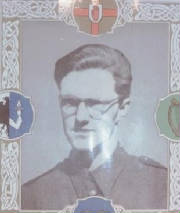
|
Seán South From Garryowen is regarded by many as the most popular rebel song of all time. It was written by Seán Costello and
concerns the ambush of an R.I.C. Barracks in Brookeborough Co. Fermanagh on the 1st January 1957. Click image for song.
|
|
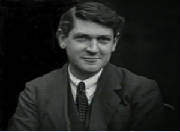
|
This Michael Collins song was written by Johnny McEvoy who is 50 years singing ballads this year [2013] . It's about the
ambush in Béal na Blá Co. Cork by unknown gunmen who shot Michael dead on the 22 August 1922.
|
|
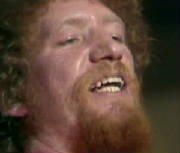
|
The Foggy Dew which was written around 1919/20 by Canon Charlie O'Neill sends the message out to Irishmen to fight for
Irish freedom rather than go and fight for the British. Luke Kelly does a slow version of this song as opposed to The Wolfe
Tones who sing it much faster. Click photo for song.
|
|
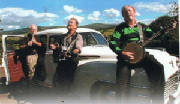
|
A Nation Once Again as recorded by The Wolfe Tones and written by Thomas Davis in 1841. Davis wrote that "a song is worth
a thousand harangues". He felt that music could have a particularly strong influence on Irish people at that time. He wrote:
"Music is the first faculty of the Irish. From the 'tones album ''Let The People Sing''. Click photo for song.
|
|
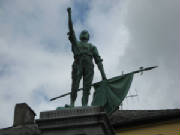
|
The Rising Of The Moon is an oldie about the 1798 rising in Ireland, written by Leo Casey aka John Keegan Casey. It was
written around 1864 and brought back to life during the ballad boom of the 1960s.
|
|
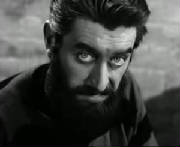
|
The Merry Ploughboy is one of those Rebel Songs that we call ''Traditional'' because nobody knows who wrote it. It was
recorded by every ballad singer in the country including The Dubliners with Ronnie doing the singing.
|
|
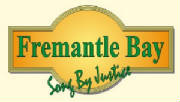
|
Fremantle Bay is a song by the group ''Justice'' . This one in my humble oponion is as good a song you'll ever hear.
If it had been released 30 years ago it would have been as popular as The Fields Of Athenry, it's a well crafted song with
a great tune and story.
|
|
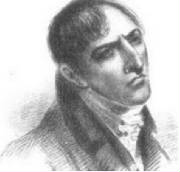
|
Bold Robert Emmet by The Dublin City Ramblers. This rebel song is about the small rebellion that took place in 1803.
For his part Robert Emmet was hung drawn and quartered in September 1803.
|
|
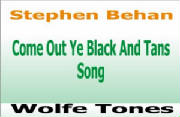
|
Come Out Ye Black And Tans by Stephen Behan tells a story about how his father when returning home from the pub with
a few pints on him would taunt his neighbours co come and fight him. A big hit for The Wolfe Tones. Click image for song.
|
|

|
Take Me Home To Mayo by Seamus Robinson and made famous by The Dublin City Ramblers is about Michael Gaughan from Mayo
who died on hunger strike in Parkhurst Prisonin 1974. He was a member of the I.R.A. Click photo for the song.
|
|
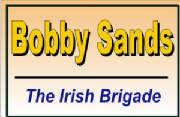
|
Bobby Sands From Belfast by The Irish Brigade. This one is about the hunger strike of 1981 when Bobby died after 66 days.
There are many songs written about him but this one is regarded as one of the best.
|
|
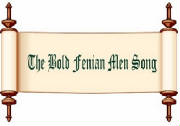
|
The Bold Fenian Men, a republican song by Michael Scanlon centred on these revolutionaries from the 19th and 20th centuries
who tried to break the link between Ireland and Britain.
|
|
|
Here's a story that appeared in Folk Magazine in 1968. It's a sort of explanation as to
why rebel songs are played at sessions in pubs in Ireland. Of late we have noticed a number of letters
appearing in the evening newspapers proporting to be from annoyed Irish people who claim that during the tourist season
last year, they brought their English visitor friends to some ballad session or other, only to be embarrassed by the singing
of rebel songs. These letters usually close with a pious wish that folk singers in the comming tourist season will not offend
our English visitors. Now far be it for us to suggest that these letters are part of some sinister campaign to undermine the
confidence of our singers in their own folk songs. We would like to point out however, some facts that have a bearing on the
matter. Just in case these letters should increase in the coming months and perhaps discourage our folk groups from singing
our rebel songs.
Firstly we are quiet sure that the majority of overseas visitors who
go to ballad
sessions know quiet well that the songs are not aimed at them personally, and if the songs tell the same wrong doing in the
past, surely they can appreciate it for its historical significance. If on the other hand the song is a contemporary
one, and mentions partition, or British troops in the Six Counties, perhaps our Irish friends who bring
visitors to hear such rebel songs, could explain to them, in a friendly way of course, that these songs are a carrying
on of the traditions of rebel songs as long as the injustice continues, and we are sure that all honest English visitors,
once they know the facts will admit that this is an injustice and will probibly end their visit to an Irish ballad session
shouting ''Up The Rebels.''
There is also the point that continetal and American visitors, come
here,
not to hear Tom Paxton or Bob Dylan but to hear Irish lads and lassies, sing out a folk song as only we, with our unbroken
tradition can.
Secondly, anybody that goes to a ballad session knows, or should know, that they are going to
hear folk songs, and these songs that are labelled Rebel Songs' are most certainly Folk Songs. Some of our most intensely
nationalistic songs were written by Priests or School Masters. But most of these Rebel songs that tell of battles won or lost,
were written by people who were classed by our overlords as illiterate peasants. Yet these songs travelled from end to end
of the country. They were carried by wandering labourers, moving from district to district looking for work. They were written
and sung by tailors, shoemakers, weavers etc. In other words, songs written by ordinary people, for ordinary people. Herein
lies the secret of their continued popularity and why they were sung whenever and where ever Irish people met. We would ask
folk groups to ponder on this before changing over to polite little American folk songs. Ask yourself what is the secret of
the continued popularity of these songs. If the reason still eludes you, we offer as further evidence, the growing popularity
of Meave Mulvaney, The Dubliners, The Wolfe Tones and The Owen Roe, and many others who continue to sing our rebel songs,
making no apologies to anybody.
From Folk Magazine, Dublin 1968
|
| |
|
|
 |
 |
 |
 |
|
THE ORANGEMAN'S GALWAY BAY
Sang to the tune of Galway Bay
Maybe some day I'll go back to dear old Ulster,
Be it only on the twelfth day of July.
To see once more the Orangemen
in procession,
And watch those loyal men go marching by.
To see again King William on the banner,
Our gracious Queen sown on the other side.
Or to sit beside Craigavon on the platform,
When he tells us how the men of Derry died.
The winds that blow across the seas from Ulster,
Are perfumed with Orange lillies as they blow.
And the men who honour Aughrim and Boyne waters,
Speak a language that the Fenians do not know.
Yet the Fenians always try to teach us their ways,
And scorn us for being what we are.
But we want no Fenian Pope or Holy Water,
No Surrender' is our watchword near
and far.
And if there's going to be a fight hereafter,
And somehow soon sure there's going to be.
We'll make the Fenian's blood flow just like water
Down Belfast Lough into the Irish Sea.
THE MEN OF DUBLIN Lyrics
(1916)
They nailed their banners to the mast: the Orange, White and Green;
A nobler set of Irishmen the world has never seen.
They knew through sloth and idleness, a nation's soul was lost,
They rose to have dear Ireland's soul and counted not the cost.
They knew well that a thousand men — they did not number more Could never break the tyrant's chain and drive him
from our shore; But this they knew — and knew it well — they would not die in vain, Their blood would save our
country's cause and give her life again.
Who was it led this noble band, and what has been their fate?
Was chivalry shown to them at last? No, worse than '98.
They fought 'gainst overwhelming odds, and held them well
at bay, Till Britain swore that she would make the innocent to pay.
Then woe betide the citizens who went abroad that night,
The soldiers lay in ambush, hid and shot them down at sight.
They shot the women and men, they shot the children, too; The Defenders of Small Nations showed herself in colours true.
Then after the surrender, there began a tyrant's reign,
When young and old — the brave and true — all
ruthlessly were slain. Tom Clarke, the Brothers Pearse, and Daly, Colbert young and gay, And Eamonn Ceannt and Connolly were
shot at dawn of day.
The same fate met Sean Heuston, McDonagh and MacBride,
But 'twas outside the G.P.O. the brave O'Rahilly died.
Mallin, Plunkett and McDermott fell before a firing squad,
Their
blood, with brave O'Hanrahan's, for vengeance cries to God.
Great numbers, too, were sentenced then and sent across the sea; The men and women, boys and girls, who strove to set
us free.
Gold could not buy the ones who fought for Ireland through that week. And they to make their sacrifice no purer
cause could seek.
Enshrined are they forever more in every Irish heart;
God bless those men and women who played that noble part.
Who left their homes behind them, who left their kith and kin,
And rallied round their banner when the fighting did begin.
May their memory live forever! May our children bless the name Of each one who fought for Ireland! May it ever be the
same.
May your country still have hero's that are not afraid to die
On the battlefield or scoffold so our proud old flag may fly.
THE REBEL ROVER
As I roved out one Summer's morning
I met a maiden of beauty rare —
The
sweet wild roses, the braes adorning
Not half so sweet are, not half so fair.
The brown thrush singing when the sun
is sinkin
The blackbird piping when the sun is down.
And the little stars in the sky a-twinkling,
Sang not so sweetly as this colleen dun
"Oh, brown tressed maiden of rarest beauty,
You've won my heart on this summer day.
To love you always will be my duty,
If you, my fair one, won't say me nay."
"Young man," she answered, "you are
a strange
And I will ne'er give my heart and hand
To any rover or to any ranger
Who will not fight for his native land."
"In the fields of France has my father battled.
My brothers, too, 'neath the fleur-de-lis,
Where the sabres flashed
and the cannons rattle
Struck many a blow to set Ireland free,
And the English flag oft' sank before them,
But their
graves are made in a foreign strai
And sad and lonely do I deplore them
Who died away from their native land."
"Oh, bright eyed maiden, the hours I'm counti nk
'Till the summons comes to the brave and In
And the green flag flies over plain and mountain.
And pikes are flashing,
and muskets, too.
And then astoreen, when the battle's over
I'll come and ask for your heart and hand
And if I fall,
forget not the rover,
Who died for you and his native land."
in
RORY OF THE HILL
"That rake up near the rafters, why leave it there so long?
The handle, of the best of ash, is smooth, and straight,
and strong: And, mother, will you tell me, why did my father frown,
When to make the hay, in summer-time, I climbed to
take it down?" She looked into her husband's eyes, while her own with light did fill, "You'll shortly know the reason, boy!"
said Rory of the Hill.
The midnight moon is lighting up the slopes of Sliabh na mBan -
Whose foot affrights the startled hares so long before
the dawn?
He stopped just where the Anner's stream winds up the woods anear,
Then whistled low and looked around to
see the coast was clear.
A sheeling door flew open — in he stepped with right good will
"God save all here, and bless your work," said
Rory of the Hill.
Right hearty was the welcome that greeted him, I ween,
For years gone by he fully proved how well he loved the Green;
And there was one among them who grasped him by the hand -
One who through all the weary time roamed on a foreign
strand;
He brought them news from gallant friends that made their heart-strings
thrill
"My SOUL! I never doubted
them! " said Rory of the Hill.
They sat around the humble board 'till dawning of the day,
And yet no song nor shout I heard — no revellers
were they:
Some brows flushed red with gladness, while some were grimly pale;
But pale or red, from out those eyes flashed
souls that never quail!
"And sing us now about the vow they swore for to fulfill"
"You'll read it yet in History," said Rory of the Hill.
Next day the ashen handle, he took down from where it hung,
The toothed rake, full scornfully, into the fire he flung;
And in its stead a shining blade is gleaming once again
-
(Oh for a hundred thousand of such weapons and such men!)
Right soldierly he wielded it, and, going through his drill,
"Attention" — "charge" — "front, point"
— "advance!" cried Rory of the Hill.
FLAG OF SINN FEIN - Conleith Martin
They raised a great standard of hope for the nation,
Their
strong arms bracing its staff to the breeze,
And proudly they bore it mid scenes of elation
Defending it bravely where foes would it seize.
Soon over each town
and each village 'twas waving,
In far-scattered hamlets on hillside and plain,
And the young men of Ireland arose from
their slaving
To march and to fight 'neath the flag of Sinn Fein.
When Pearse led his comrades that day by the Liffey
Behind it they marched with a soldierly mien,
And soon over
Dublin's great fortress 'twas flying
The hope of the nation, White, Orange and Green.
Beneath it fought men who were proud to be shedding
Their blood,
ever mindful 'twould not flow in vain,
Each man a bridegroom at Dark Rosaleen's wedding
As bravely they died 'neath the flag of Sinn Fein.
In the fresh breeze of morning it floated in glory,
In the lull of the night by its staff it reclined,
In the hour
of surrender — no hand free to save it
Lead-sprayed and shell-torn to the flames 'twas consigned.
Through the
night the fire laboured, dawn saw the roof caving
Then the smoke cleared away and the sun shone again.
And above the gaunt ruin, still defiantly waving
Was that battle-scarred emblem, the flag of Sinn Fein.
THE ULSTER HILLS Seosamh Mac
As Ireland deep in slumber lay.
Her wise men counselled peace,
Until the grace to England came,
Her death grip to release.
But there arose to face our foes
Some gallant men who swore
To raise the flag of Ireland aloft
On the Ulster hills once more.
Chorus:
We hail with pride all those who died,
Our freedom to maintain,
And raise the flag of Ireland aloft
On the Ulster hills again.
From Limerick came 'a soldier brave,
Sean Sabhat, to lead the band
Of volunteers who did invade
The barracks strongly manned
By English troops and native dupes,
And Sean and Feargal died,
In raising over the Ulster hills
Old Ireland's flag with pride.
Chorus:
O Hanluain brave from Monaghan,
Before he went away,
He got his mother's blessing,
"For you," she said, I'll pray.
I gladly give you to the cause,
If God will you should die
In raising over Ulster hills
Old Ireland's flag on high."
Chorus:
Let neither gain or cowardly fear
Make us stand aside,
We won't deny — we'll loudly cry
Their names with manly pride,
Feargal Og 0 Hanluain!
Sean Sabhat from Shannon side.
To raise our flag over Ulster hills,
They bravely fought and died.
A MOTHER'S BLESSING - rebel song
When Ireland is calling, Feargal, my boy,
What more can
a fond mother do,
Only search in her heart and say with a sigh:
"God's blessing and mine be with you."
From Nazareth the road led to Calvary's Hill,
And HIS Mother then
showed the way
A Mother should share in the cause of her Son
When destiny chooses the day.
When Ireland is calling, Feargal, my boy,
Her message comes but to the few.
Who, hearing His Voice in the tumult
of Life.
Are ready to dare and to do.
Daring the might of aggression and power
To fearlessly right a grave wrong
"May
God's Blessing and mine be with you, my boy,
And with Ireland to whom you belong.
(Feargal O'Hanlon received his mother's blessing before leaving home] for
the Battle of Brookborouch)
Lament Of The Irish Emigrant
I'm sittin' on the stile, Mary, where we sat side by side
On a bright
May mornin', long ago, when first you were my bride,
The corn was springin' fresh and green, and the lark sang loud and
high.
And the red was on your lip, Mary, and the love-light in your eye,
The place is little changed, Mary, the day is bright as then,
The lark's loud song is in my ear, and the corn is
green again;
But I miss the soft clasp of your hand, and your breath, warm on i
cheek,
And I still keep list'nin'
for the words you never more will speak.
'Tis but a step down yonder lane, and the little church stands near
The church where we were wed, Mary, I see the
spire from here.
But the graveyard lies between, Mary and my step might break your rest
For I've laid you, darling,
down to sleep, with your baby on your breast
I'm very lonely now, Mary, for the poor make no new friends;
But 0 they love the better still, the few our Father
sends!
And you were all I had, Mary, my blessin' and my pride!
There's nothin' left to care for now, since my poor
Mary died.
Yours was the good, brave heart, Mary, that still kept hopin' on
When the trust in God had left my soul, and my arm's
young streng was gone;
There was comfort ever on your lip, and the kind look on your bra
I bless you, Mary, for that
same, though you cannot hear me now.
I thank you for the patient smile when your heart was fit to break.
When the hunger pain was gnawin' there, and you
hid it for my sake
I bless you for the pleasant word, when your heart was sad and sore
I'm thankful you are gone,
Mary, where grief can't reach you more
I'm biddin' you a long farewell, my Mary -- kind and true!
But I'll not forget you, darling, in the land I'm goin'
to;
They say there's bread and work for all, and the sun shines always
But I'll not forget old Ireland, were it fifty
times as fair!
And often in those grand old woods I'll sit and shut my eyes. And my heart will travel back again to the place where
Mary lies; And I'll think I see the little stile where we sat side by side; And the springin' corn, and the bright May morn
where first you
my bride.
--HELEN SELINA, LADY Dufferin
IF
(Le caoin-chead ROSC)
If I could coax an Irish child to listen
To Pearse's lines about the
slanting sun;
If I could help him glean a little fraction
From this man's knowledge of the Eternal One.
If I could lead him in Pearse's footsteps,
And fire him with the oath that this boy vowed;
If he perchance should
kneel and thus pray likewise,
I'd sure feel a teacher mighty proud.
If I could charm this child when twilight lingers
Around the fire with tales of long ago;
Of heroes bold who stood four-square for freedom —
At such a school young Pearse felt freedom's glow.
If I could preach a love of our sireland,
As the mother Pearse did with her little ones.
Then I should be a teacher of the mothers,
Who do forget that Ireland needs her sons.
If I could tell this child what Pearse endured
To free such parents from slave-mind plague;
Then I might say another Pearse was moulded
To snatch our lost ideals from the grave.
- LTBHIN Nic GABHANT~
Lament For Patrick Pearse
Written by Joseph M. Crofts
Padraig Mac Piarais a real Geal Na hEireann.
Oh
why did you leave us in sorrow to pine.
Your gone you are dead in the bloom of your manhood.
In heaven's fair kingdom
may your soul shine.
You who fostered and taught a young generation
To live the pure life of the Gael, hear our cry.
Pray
to God every day for the young Irish nation.
A Padraig who leave us so.
Padraig Mac Piarais, a file na heireann,
ever bold was your pen with the truth.
For your of truth, proud champion
of vertue
of love and of beauty in nature and soul.
You were slain, a rhuire's fair land that bore you,
But your
spirit's abroad on winds passing by.
And our people that breath them are stirred and undaunted.
For they know that you
left us for.
|
|
 |
 |
|
 |
|
|
|

